Flash flooding quickly turned into rivers that swept away all in their path, with residents of Alcanar saying it was lucky no one had been killed.
Megan Baynes
News reporter @megbaynes
Thursday 2 September 2021
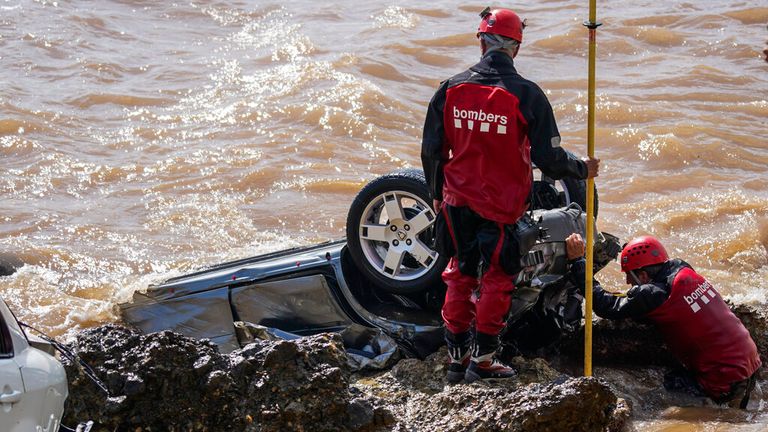
https://news.sky.com/story/spain-intense-flooding-sees-cars-swept-into-mediterranean-sea-and-buildings-filled-with-mud-in-alcanar-12397464
Play Video - Flash floods hit eastern Spain
Flash floods hit eastern Spain
Intense flooding in Spain has seen cars swept into the Mediterranean Sea, while homes and businesses have been filled with mud and debris.
Residents of the northeast town of Alcanar said it was lucky no one had been killed, as more than 250 litres per square metre of rainfall flooded the area between 12am and 6pm on Wednesday.
"We had to get upstairs to our apartment and then leave it all in God's hands," said Rosa Maria Sancho, the 67-year-old owner of a restaurant on the Alcanar boardwalk.
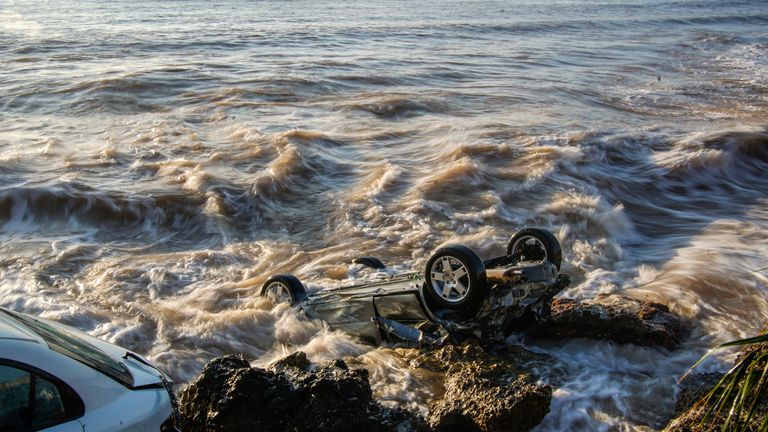
Image:Wrecked cars got stuck in the rocky shore of Alcanar, in northeastern Spain.
Pic: AP
Flash flooding quickly turned into rivers that swept away everything in their path. Several cars were carried away, and around a dozen ended up tossed in the surf of the Mediterranean Sea.
Firefighters had to use a helicopter to rescue three people in serious danger, while more were pulled from cars caught in rising waters.
Almost 60 residents were relocated to hotels, while a further 16 spent a night on cots in a sports pavilion. Four people had to be rescued from a nearby camping ground.
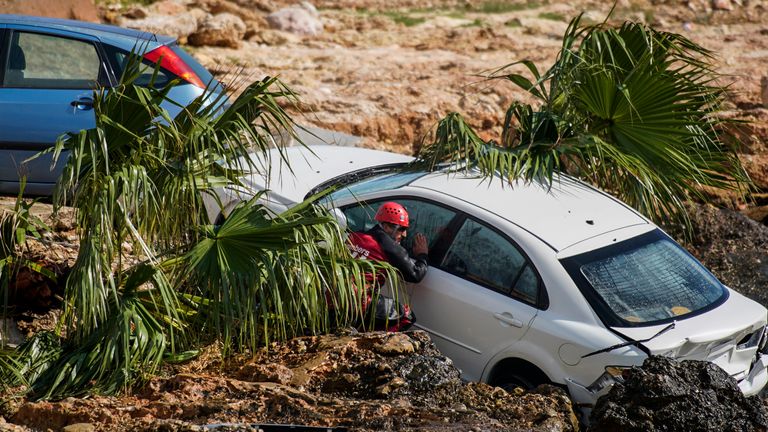 Image:Almost 60 residents have been relocated to hotels. Pic: AP
Image:Almost 60 residents have been relocated to hotels. Pic: AP
Other parts of Spain's central and northern areas, including Madrid, were also flooded on Wednesday.
Authorities were working to re-establish transit on roads and train lines made unpassable by mud and water, while large areas of Spain's north and its Balearic Islands remain on alert for storms for a second consecutive day.
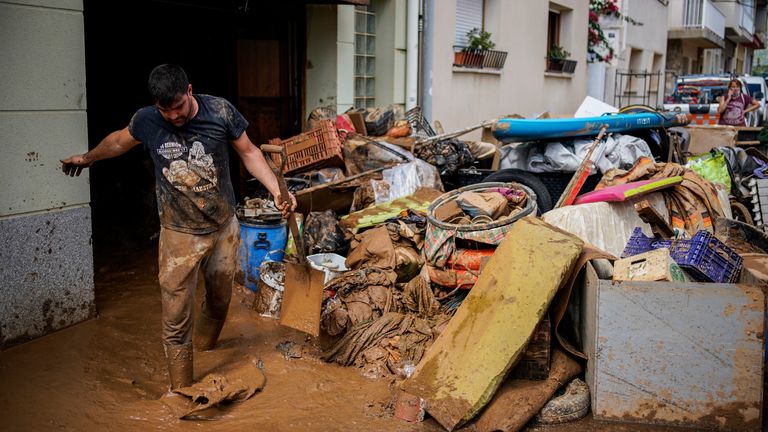
Flash flooding quickly turned into rivers that swept away everything in their path. Several cars were carried away, and around a dozen ended up tossed in the surf of the Mediterranean Sea.
Firefighters had to use a helicopter to rescue three people in serious danger, while more were pulled from cars caught in rising waters.
Almost 60 residents were relocated to hotels, while a further 16 spent a night on cots in a sports pavilion. Four people had to be rescued from a nearby camping ground.
 Image:Almost 60 residents have been relocated to hotels. Pic: AP
Image:Almost 60 residents have been relocated to hotels. Pic: APOther parts of Spain's central and northern areas, including Madrid, were also flooded on Wednesday.
Authorities were working to re-establish transit on roads and train lines made unpassable by mud and water, while large areas of Spain's north and its Balearic Islands remain on alert for storms for a second consecutive day.

Image:Flash flooding quickly turned into rivers that swept away all in their path. Pic: AP
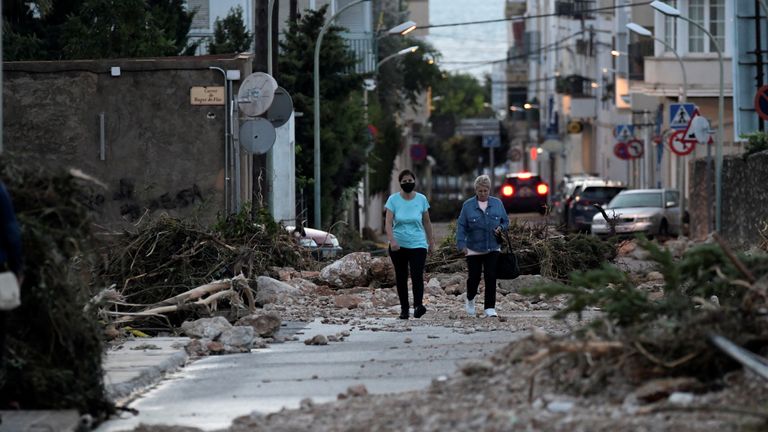

Image:Spain's national weather service said the country is seeing an increase in hard rainfall. Pic: AP
Spain's national weather service said that the country is seeing an increase of hard rainfall and droughts linked to climate change.
"Spain is observing, above all in points of the Mediterranean, periods of torrential rain that are more intense and longer periods of drought that are interrupted by these intense rains," national weather service spokesman Ruben del Campo said.
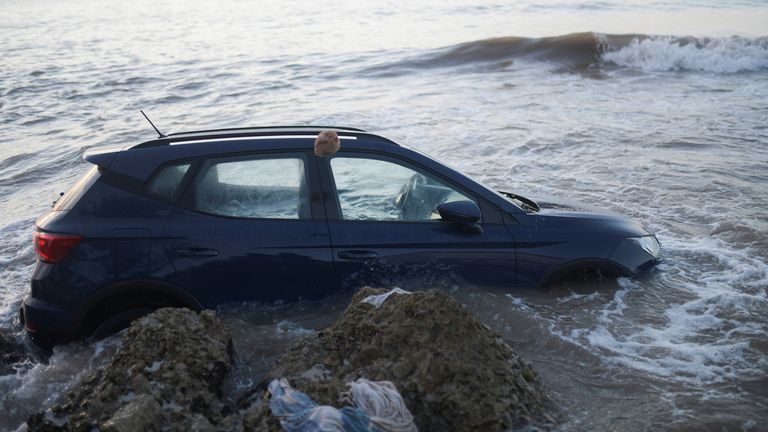
Spain's national weather service said that the country is seeing an increase of hard rainfall and droughts linked to climate change.
"Spain is observing, above all in points of the Mediterranean, periods of torrential rain that are more intense and longer periods of drought that are interrupted by these intense rains," national weather service spokesman Ruben del Campo said.

Image:Cars seen in the sea after floods caused by heavy rains. Pic: AP
It comes as the UN has warned weather disasters are striking the world four to five times more often and causing seven times more damage than in the 1970s.
Experts say such extreme weather events will only become more common, with growing calls for national governments to take urgent action to reduce carbon emissions.
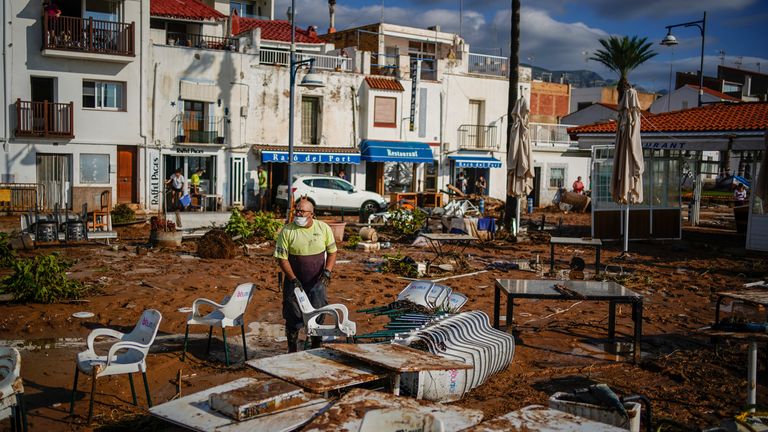
It comes as the UN has warned weather disasters are striking the world four to five times more often and causing seven times more damage than in the 1970s.
Experts say such extreme weather events will only become more common, with growing calls for national governments to take urgent action to reduce carbon emissions.

Image:Residents are now cleaning up the town. Pic: AP
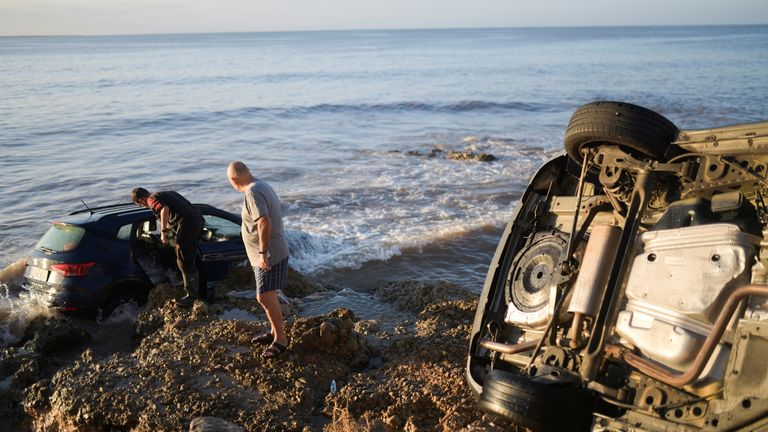 Image:Large areas of Spain's north and its Balearic Islands remain on alert for storms. Pic: AP
Image:Large areas of Spain's north and its Balearic Islands remain on alert for storms. Pic: AP
Meanwhile, in America, a state of emergency has been declared in New York and New Jersey after Storm Ida dumped a month's worth of rain on New York City. Nine people have reportedly been killed in the flooding.
Last night, New York City suffered its wettest hour on record, with more than 80mm of rain falling in Central Park in the space of 60 minutes.
 Image:Large areas of Spain's north and its Balearic Islands remain on alert for storms. Pic: AP
Image:Large areas of Spain's north and its Balearic Islands remain on alert for storms. Pic: APMeanwhile, in America, a state of emergency has been declared in New York and New Jersey after Storm Ida dumped a month's worth of rain on New York City. Nine people have reportedly been killed in the flooding.
Last night, New York City suffered its wettest hour on record, with more than 80mm of rain falling in Central Park in the space of 60 minutes.
No comments:
Post a Comment